Baptist Union Council: March 2019
Justice concerns were at the heart of the latest meeting of Baptist Union Council, which took place at the Hayes Conference Centre in Swanwick last Wednesday and Thursday (March 13-14).
Council members gathered to consider changes to our Union's ethical investments policy, which had last been updated in 2013. Enabling Baptist Voices and Action in the Public Square is one of the four areas of shared work across Baptists Together, and members heard a presentation about the Joint Public Issues Team. There was also a presentation from the Gender Justice Group, while reflections on the Kingdom of God were weaved into the time together.
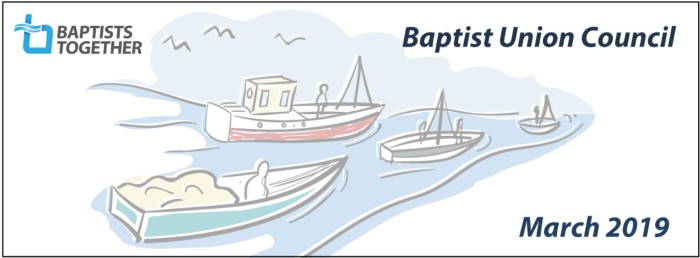
Scroll down for the following reports:
-
Ethical Investments Policy
-
Joint Public Issues Team
-
Gender Justice Group – Baptist Women in Ministry
-
Finance and Pensions update
-
Retired Baptist Ministers’ Housing Society (RBMHS)
-
Ministerial Recognition Rules
-
New churches
-
Key Roles Nominations
-
Baptist Steering Group (BSG)
-
Reflections on the Kingdom of God
-
Prayer session / Facebook live
Ethical Investments Policy
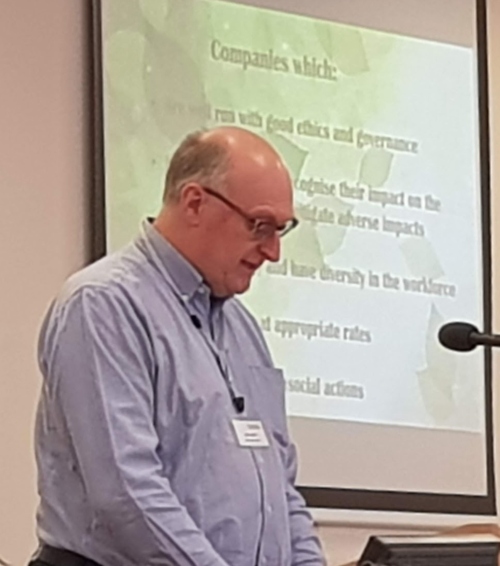 Three sessions of this Council were devoted to reviewing and updating our Union’s ethical investments policy, which was last updated in 2013. The sessions were introduced by treasurer John Levick (pictured), who explained that the policy is part of our response to the biblical emphasis on the command for justice.
Three sessions of this Council were devoted to reviewing and updating our Union’s ethical investments policy, which was last updated in 2013. The sessions were introduced by treasurer John Levick (pictured), who explained that the policy is part of our response to the biblical emphasis on the command for justice.
We want to invest in companies which:
-
are well run with good ethics and governance
-
have policies which recognise their impact on the wide community and mitigate adverse impacts
-
treat staff fairly and have diversity in the workforce
-
pay their taxes at appropriate rates
-
do not engage in unsocial actions
We also have to balance ethical financial investment with what’s in the best interest of our Baptist family: our investments provide a good source of income that support delivery and enhancement of mission.
‘Striking a balance between risk, reward and ethical considerations is complex,’ said John.
To help in their deliberations, council members heard from Epworth Investment Management. Epworth is owned by the Central Finance Board of the Methodist Church and acts as investment managers for non-Methodist churches and charities.
Epworth CEO David Palmer stressed there are no easy decisions when it comes to ethical investing: no company is perfect, and it’s about compromise. Christians do have a voice and can effect change. He encouraged Baptists to be active investors: Epworth meets company managers and votes with their shares.
A particular focus for the Methodist Church has been climate change, and particularly oil and gas companies. These companies typically produce a high dividend but also have a significant negative impact on the environment.
Miles Askew, head of research, gave a more detailed account of how the Church discerns which companies to invest in in relation to climate change.
He explained that a Christian ethical investor might seek out companies leading efforts to transition to a lower carbon economy. Church investors together can engage with carefully selected companies that are most likely to be open to change, as well as lobby governments and engage with the broader church.
He said that Epworth believes exclusion should be the last course of action. The greatest power investors have is their ability to engage with companies. If you divest out of a company, your voice is lost. In addition, companies that ‘might justifiably be seen as part of the problem, may be part of the cure.’
Council members were invited to break onto tables and take part in an exercise to highlight the complexities. Each table was given a sector (supermarkets, utilities, alcohol, mining, tech giants (Facebook, Amazon, Google and Netflix) and PepsiCo (a multinational food and beverage corporation) and encouraged to think about the pros and cons of investing. Feedback was shared from each.
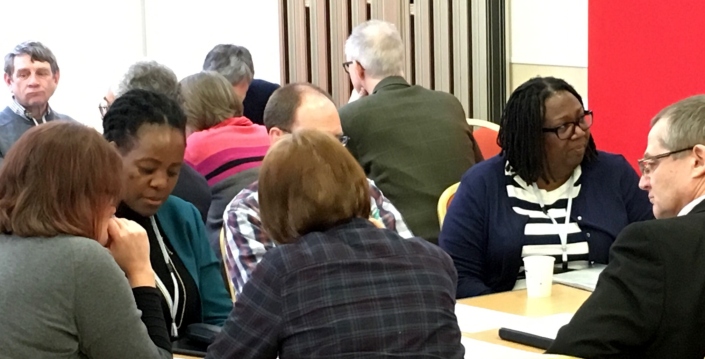
On Thursday morning members voted on a series of updates to the current policy. One area where we already seek to invest in companies making a positive difference is health and we have now added healthy food to reflect the need to address issues such as obesity. We also already seek to invest in companies which have good Human Rights records and have now a specific reference to modern day slavery to emphasise this important area.
On the negative side we added companies engaged in coal and tar sands extraction as those to be excluded because of their impact on climate change. A further proposal that was carried, after some debate, states that companies engaged in fossil fuel extraction will be excluded unless those companies are considered to be moving significantly to sustainable energy policies. A sizeable minority wanted immediate disinvestment from all fossil fuel extraction. These changes keep us broadly aligned to the other UK denominations.
The updated policy will be provided to our investment managers for implementation. We will also use it when we next review our Investment Managers. Council asked for a further review in three years’ time.
Joint Public Issues Team
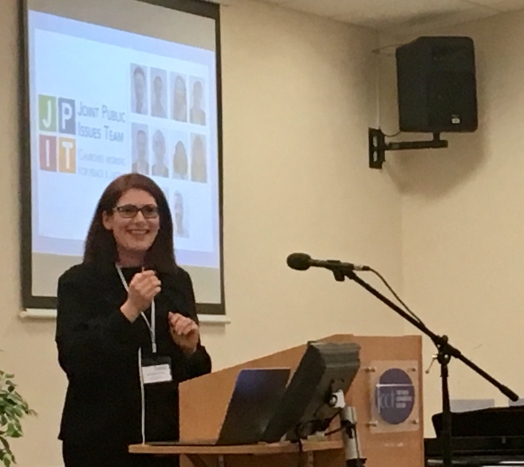 Our Public Issues Enabler Beth Allison-Glenny gave an introduction to the Joint Public Issues Team (JPIT). JPIT brings together four denominations – the Methodist Church, Church of Scotland, United Reformed Church and our Baptist Union of Great Britain to resource and energise congregations and help magnify Baptist voices as they speak out on public issues.
Our Public Issues Enabler Beth Allison-Glenny gave an introduction to the Joint Public Issues Team (JPIT). JPIT brings together four denominations – the Methodist Church, Church of Scotland, United Reformed Church and our Baptist Union of Great Britain to resource and energise congregations and help magnify Baptist voices as they speak out on public issues.
The four denominations often come to the same conclusions on certain issues – teaming up in this way “enables us to say the same things, but louder”, as well as pool resources. Each denomination brings a particular contributions: for example, as Baptists we are all about resourcing the local church. Being part of the team also gives us access to policy experts.
Why bother about justice issues – shouldn’t we be getting on with evangelism, asked Beth? Well, this is about evangelism. She highlighted statistics that showed millennials and younger who do not have a faith, viewed church as a negative force. We need to change the climate of our conversation, said Beth. ‘We need to show we are doing good things; and we are – working for a fairer, more just world.’
Beth highlighted recent JPIT campaigns, including Lift the Ban and Living Lent, and the impact they can have. The letter signed by faith leaders at the launch of Lift the Ban was carried in The Telegraph. Living Lent is a resource that encourages participants to be open to transformation, and picks up this image of hungering and thirsting for righteousness
‘It’s about saying we are people who are passionate about making the world a better place.’
One of our four areas of shared work across Baptists Together is Enabling Baptist Voices and Action in the Public Square.
Gender Justice Group – Baptist Women in Ministry
Baptists have been accrediting women in ministry for 100 years. Gender Justice Group members Beth Allison Glenny (Public Issues Enabler) and Mary Taylor (Regional Minister Yorkshire Baptist Association) gave a presentation on Thursday evening to mark that anniversary, show where we are, and where we are going.
Beth said there are a number of things we are doing well as a Union. To illustrate this, she highlighted two positive stories from women at the start of their ministries, gleaned from the Baptist women minister’s Facebook group.
However, despite ordaining women for longer, the statistics do not compare well with other denominations. And the real issue is, Beth continued, we don’t know why. There has been no research into why we are lagging behind our sister denominations – and this lack of evidence makes it hard to address any structural challenges 'if we don’t know what the challenges are'.
Council members were invited to share what they perceived to be the key issues. Answers included theology, a lack of funding for ministerial students; a legacy issue – because our overall stats are low, this could be off-putting; and a lag from not having the role models.
Mary Taylor spoke of the centenary conference last year: Celebrating, Surviving and Thriving: Women in Baptist Ministry. Women of different ages and stages in their ministries gathered, bringing together their stories, worship, celebrating, the discussions. Even though there were some painful stories, there was such positivity at the conference and a commitment to our shared life: ‘the women in the Baptist family want to be co-workers in the gospel, in a way that blesses the whole.’ This was expressed in the ‘…and your daughters shall prophesy’ statement that emerged from the conference.
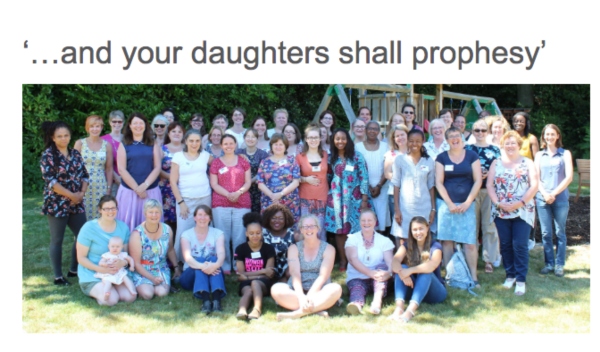
Mary explained how in this centenary period, resources have been released, and Baptists Together is now advertising for a Faith and Society Enabler (Centenary Development) who will look at statistics, work with Associations, and how we can become more balanced at senior leadership levels. The post is for three years.
Mary encouraged Council members to be aware of the unconscious bias that’s deeply ingrained in us and our congregations, and the need to be creative to address it.
The Eva’s Call community artwork was shared. This artwork captures the things people have said about female ordinands in the Church of England. The sentiments are familiar to Baptist women ministers and those exploring a call, Beth said, concluding we have some way to go. ‘We may have smashed the stained glass ceiling, but there are some shards on the floor.’
She added, ‘This is a family problem. We want to call you to work deeply and actively so that we never have to have this conversation in Council except to say how far we have come.’
Finance and Pensions update
2018 ended reasonably well in terms of our Union’s accounts. We were both ahead of the overall income budget and had spent less than budget, giving a surplus. However, the underlying trend of decreasing Home Mission giving had continued, said Richard Wilson, Support Services Team Leader. The shortfall was made up by better than expected legacy income.
Richard noted that Home Mission giving continues to fall this year: by the end of February it was three per cent lower than in 2018. We need a four per cent increase on 2018 to meet the 2019 target. If this trajectory continues we could miss our Home Mission 2019 appeal target by £250,000 - £300,000.
Richard also gave an update on the Pension Scheme and the Family Solution. Since the last Council gathering the key provisions of the Family Solution have been successfully implemented, with £33m being paid into the scheme, and the deficit considerably reduced.
An update went out to all employers and members in the scheme in January. Further employer communication will go imminently to update churches on the approach to double cessation events. The Family Solution will allow us to avoid the double counting of church liabilities where a church has multiple cessation event.
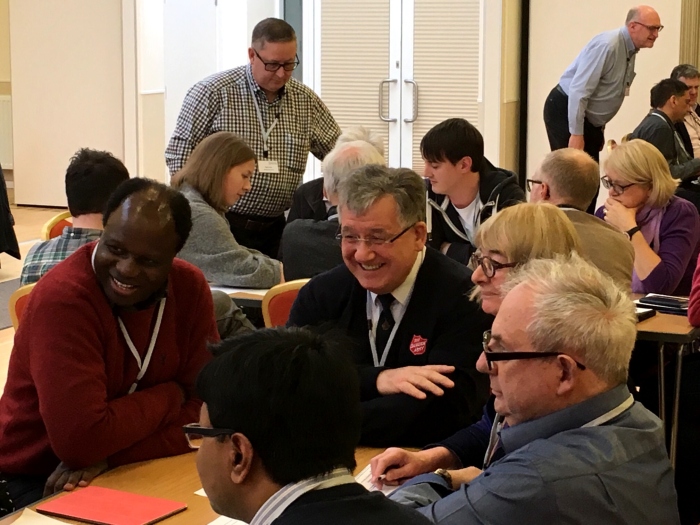
Retired Baptist Ministers’ Housing Society (RBMHS)
The Retired Baptist Ministers’ Housing Society presented its annual report to Council, the final time it will do so. This is because it has established a separate charity called The Retired Baptist Ministers Housing Organisation [RBMHO], which will encompass the activities previously undertaken by RBMHS. The change came about to facilitate its involvement in the Pension Scheme Family Solution, and to establish a new charity structure to take forward the work of RBMHS for the future. RBMHO is accountable to Baptist Union trustees.
Chair Bill Johnston told Council members that in 2018 the Society had maintained its 100 per cent record of providing a house to qualifying applicants. It currently provides homes for more than 450 people, including ministers and spouses.
He said the Society had been supported by substantial legacies, although legacy income fell last year. Profits on sold homes were poured back into new ones. ‘The society goes well, it lives on income, and makes investments,’ Bill said. He noted that interest rates had been low for a prolonged period, and should they rise the impact would be ‘substantial’.
Ministerial Recognition Rules
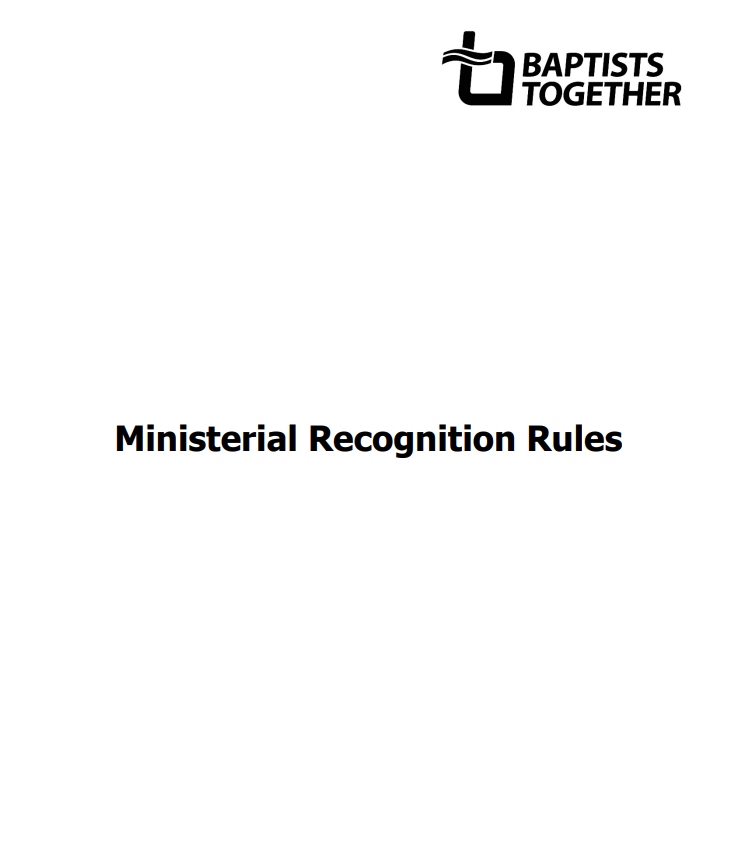 Revisions to the Ministerial Recognition Rules designed to enable 'much more flexibility in the forms of ministry which are recognised by us' were presented to Council for approval.
Revisions to the Ministerial Recognition Rules designed to enable 'much more flexibility in the forms of ministry which are recognised by us' were presented to Council for approval.
In his report to Council, Andy Hughes, Ministries Team Leader explained, ‘Previously we had 3 main categories for active ministry in the register, with pastors in Category 1, youth specialists in Category 2 and evangelists in Category 3. To move from Category 2 to Category 1 meant going back to the Association MRC to test the change in calling, and then engaging in further training. As new forms of ministry such as pioneering have emerged the response could have been to create additional categories to recognise these as distinct ministries.
'However, the reality is that the way in which ministers engage in ministry is often shaped by the context they find the Lord leading them into, so our procedures need to be more flexible enabling us to respond to the leading of the Spirit. Category 1 has been widened and will in time replace Categories 2 and 3 which are now closed to new entrants.’ The changes are in line with the recommendations of the Ignite report.
Another change involved replacing ‘unbecoming conduct’ with ‘gross misconduct’, which better reflected the seriousness of the term.
The changes were passed unanimously.
New churches
Two churches which have joined our Baptist Union were welcomed and affirmed by Council. They are Burnham on Sea Baptist Church (WEBA) and Narberth Baptist Fellowship (SWBA).
The practice of bringing churches ceasing membership of our Baptist Union has also begun, said Stephen Keyworth, Faith and Society Team Leader. This time there were five: Hivings Free Church (CBA); Bethany Baptist Church; Little Thetford (EBA); Crossway Christian Fellowship (LBA) and Victory Family Christian Centre (LBA).
‘We give thanks for their life and witness over the years,’ said Stephen. Council moderator David Mayne prayed for all the churches.
Key Role Nominations
 Council approved the nominations of Dawn Brown and David Pile to the Accompanying Group, which prayerfully supports the Baptist Steering Group (BSG).
Council approved the nominations of Dawn Brown and David Pile to the Accompanying Group, which prayerfully supports the Baptist Steering Group (BSG).
‘We are delighted to bring Dawn Brown and David Pile,’ said Rupert Lazar, moderator of the Key Role Nominations Team. ‘We think they would be great for accompanying team.’ They replace Daniel Hatfield and Eric Aidoo, who have come to the end of their three year service.
Following fifteen years as minister at Markyate Baptist Church, Dawn moved to Burnham on Sea in April 2015, with her husband Graham, to develop a retreat house ministry. David has been the minister at Basford Road Baptist Church in Nottingham since October 2014.
Members also unanimously approved three new co-options to Council, commended by Key Roles Nominations Team. They are Dion White and Lois Delong, who have both Inspiring Leadership Programme, and Adrian Semerene, pastor of Gamlingay Baptist Church (EBA). Rupert said with such a focus on emerging leaders, he was delighted that all three are within the 18-35 age range.
Baptist Steering Group (BSG)
Council reflected on the composition of the Baptist Steering Group. This came about as a result of the Partnerships discussion at the November Council, when it was recognised that Partnerships have not become a formal aspect of our structure. The composition of BSG was established around Partnerships. Council had asked Trustees to reflect and consult about the composition of BSG, and share their conclusions with Council.
Alastair Mitchell-Baker, moderator of Trustees, introduced the discussion. He said the straightforward option would be to try BSG as a larger group now, with 13 Regional Team Leaders, 6 College Principals, 3 Specialist Team Leaders, 1 Council representative and 1 Trustees representative, enabled and led by the General Secretary.
However, this has the potential to be unwieldy. Alastair said now is a good time to step back and ask if there is a better way for us as a Baptists Together family to achieve the core tasks of BSG.
He introduced the language of an eco-system, which stresses the inter-connectedness of different elements and has a focus on the whole rather than the individual parts. This image also relates to Paul’s description of the Church as a body. Trustees believe considering Baptists Together as an ‘ecosystem’ is a good way of thinking about how the different components of our family might relate together.’ Alastair sought feedback from Council members to feed into Trustees’ thinking prior to wider consultation.
Reflections on the Kingdom of God
A series of reflections on the Kingdom of God took place throughout Council. At the outset of the gathering on Wednesday morning, trustee Diane Watts spoke on the parable of the mustard seed, with a particular focus on the line ‘the birds nested in its branches.’ The Kingdom of God is a place where the wild birds nest – all of us together. It began when the Son of Man planted the seed. We are not in control of the tree or the seed. As Baptists Together, do we hold those who sometimes feel they don’t have a place of their own? Do we seek out, not just the voice of the poor, but allow them to shape us? Di encouraged us to be open to the gardener’s voice; be open to knowing what to let go. ‘Listen to each other; and listen to God.’
On Thursday morning Carol Murray (CBA) recounted a visit to a leprosy colony in Kolkata. This was a place of full employment ‘people with stumps and disfigurement all working away’. It was an enabling place people had been given their dignity and life. ‘Here was the kingdom personified; established in an unlikely place. They had established something, choice was made
‘People living in enjoyment and fulfilment… Christ’s manifesto here personified.’
Rupert Lazar closed the gathering on Thursday afternoon, taking James 2: 1-13 as his text. He said that God finds favouritism ‘absolutely abhorrent’. Favouritism is something we have all probably benefitted and suffered from. To love as God’s people means a different way of living and being, where a person’s humanity must be respected. ‘It inevitably includes justice,’ Rupert said. The story of the Good Samaritan demonstrates this kingdom living: no discriminating, no partiality and no favouritism.
Facebook live
Worldwide technical issues with Facebook prevented the prayer session on Wednesday evening from being broadcast live. However, the session, led by Lynn Green and President Dave Gregory, was recorded and is now available on Youtube.
Baptist Times, 19/03/2019